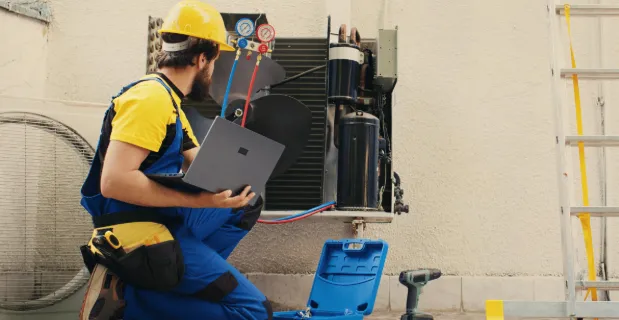Choosing between HVAC repair and replacement comes down to age, efficiency, and cost. The Chill Brothers recommend repair for newer systems with light wear and replacement when age, rising bills, or repeated issues add up.
When your air conditioner stalls on a hot afternoon, one choice stands out. Choose wisely, and you’ll save money, energy, and stress for years. In this guide, you’ll get expert HVAC advice that keeps the language clear and the math simple, so you can decide with confidence between repair and replacement.
Also Read: Lajoie Funeral Home: Serving Families with Heart
How Long Does an HVAC System Last?
Most central air conditioners work for 15 to 20 years with steady care. Heat pumps usually run 10 to 15 years. Furnaces can stretch closer to 30 years in mild regions.
Age is only a clue. You also need to consider how often the unit ran, how hot or dusty your climate is, and whether filters and coils were cleaned on schedule. These factors can add or subtract from the system’s expected lifespan. If your system is under 10 years old and has been serviced regularly, a repair often makes sense. But an 18-year-old unit that worked hard daily may not be worth patching.
The $5,000 Rule Keeps Repair Math Easy
Every repair quote hides two more costs:
- Extra electricity from worn parts
- The chance of another breakdown
The $5,000 rule cuts through the guesswork: multiply the age of the system by the repair cost. If that number exceeds $5,000, replacement is the safer bet.
Quick Example
- 12-year-old unit × $450 repair = $5,400 → Replace
- 8-year-old unit × $300 repair = $2,400 → Repair
Always factor in your power bill. Older compressors can use 20 to 30 percent more electricity than high-efficiency models.
5 Clear Signs It Is Time To Replace
Sometimes, the unit tells you it’s done. Watch for these red flags:
- Frequent breakdowns: More than two service calls in a season
- Outdated refrigerant (R-22): Phased out and costly
- Energy bills rising 20 percent or more
- Hot and cold rooms: Indicates airflow or duct problems
Safety or code issues: Rusted heat exchangers, frayed wires, missing shut-offs
Many online lists skip code concerns and refrigerant rules. We include them because leaks and fines can cost you more later. If two or more signs apply, consult an expert like The Chill Brothers.
Efficiency Rules Changed in 2023: Here Is Why It Matters
In January 2023, the U.S. adopted SEER2 standards. New systems must meet stricter requirements and are about 7% more efficient.
Updated HVAC calculators provide accurate payback estimates. Buying today locks in those gains for 10 to 15 years. This is one more reason replacement can pay off faster than expected.
Tax Credits and Rebates Lowering Real Cost
Here are the incentives that reduce real cost:
- Federal Energy Efficient Home Improvement Credit: 30 percent of the installed cost, up to $2,000 per year for qualifying systems
- Utility rebates: Many providers offer $200 to $800 per system
- Low-interest on-bill loans: Some states let you repay via your electric bill
With these savings, a $9,000 high-efficiency heat pump may cost closer to $6,000. Compared to three major repairs over five years, the upgrade often makes more sense.
Maintenance Tips That Extend System Life
Routine care costs little but saves plenty. Here’s what matters:
- Change filters every 30 to 60 days during peak use
- Flush the drain line each spring to prevent flooding
- Keep outdoor coils clear trim shrubs at least 2 feet away
- Check insulation on refrigerant lines
- Schedule annual tune-ups to catch issues early
Good maintenance can delay replacement, but it cannot reverse system age. Use it to buy time, not avoid replacement altogether.
The Chill Brothers Recommendations
Still unsure? Use this simple checklist and answer “yes” or “no”:
Is the unit under 10 years, and the repair under $800?
Yes → Repair
Does age × repair cost exceed $5,000?
Yes → Replac
Have your energy bills jumped 20 percent or more?
Yes → Replace or schedule an energy audit
Do comfort or safety issues show up?
Yes → Replace
If you need help at any step, the Chill Brothers are here to assist. From permits to rebates to startup, we manage every detail from start to finish.
Quick Solutions: Repair vs. Replacement
| Factors | Repair | Replacement |
| System Age | Under 10 years | Over 15 to 20 years (AC), 10 to 15 (heat pump) |
| $5,000 Rule | Age × cost under $5,000 | Age × cost over $5,000 |
| Repair Cost | Minor repairs | Major, repeated repairs |
| Breakdowns | Less than 2 per season | Frequent service calls |
| Energy Bills | Remain steady | Rising 20 percent or more |
| Refrigerant | Uses approved refrigerants | Uses phased-out R-22 |
| Comfort/Safety | No comfort or code issues | Uneven temps or safety/code violations |
| Incentives | Not applicable | Federal tax credits and utility rebates |
Repair your system if it’s younger, needs minor work, and runs efficiently. Replace it if it’s older, inefficient, and showing signs of failure.
Final Thoughts
Whether you repair or replace depends on the condition of your HVAC system. The Chill Brothers recommend repair for systems under 10 years old with low repair costs and few issues. If your system is older, inefficient, or frequently breaks down, replacement ensures better performance and long-term savings.
FAQs
What Is the 50% Rule for HVAC Decisions?
If the repair cost is 50 percent or more of the cost of a new system, we generally recommend replacement for better value and long-term efficiency.
Does New HVAC Equipment Always Save on Energy Bills?
Yes. New systems, especially SEER2-rated units, are more efficient and often lower your electric bills by 20 to 30 percent within the first year.
How Do I Know If My HVAC System Is Undersized or Oversized?
If your home has inconsistent temperatures, short cycling, or poor humidity control, the system may be improperly sized. We can perform a load test to confirm.
What Happens If I Delay Replacing a Failing HVAC System?
Delays often lead to higher energy bills, more frequent breakdowns, and potential safety hazards. Acting early avoids compounded costs and discomfort.
Can I Finance a Replacement System Without Upfront Costs?
Yes. Many utility programs offer low-interest, on-bill financing options so you can upgrade now and pay monthly through your electric bill with little upfront expense.




